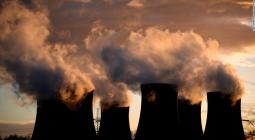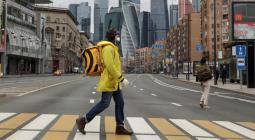Never Waste a Crisis: For a Sustainable Recovery from COVID-19.

Recent generations, including ours, lived – and are still living – through four global crises. But the good news is that this time we have our blueprint to choose a sustainable and resilient socio-economic-environmental pathway. An opinion piece from an expert in Sustainable Development, Prof. Phoebe Koundouri
The pandemic of COVID-19 has clearly proven the ability of governments to take dramatic measures to mitigate an existential threat, as well as people’s ability, at least in the short run, to adapt to new restricted lifestyles imposed by these measures. A second message is that the timing of the enactment of measures is crucial for their effectiveness in saving lives. A third message is that the response to COVID-19 came from national states, while International Organizations lack in terms of explicit imminent response.
The measures that can help solve the health crisis can make the economic crisis worse and vice versa. The aim of health-related measures (mainly strict social-isolation) is to spread the pandemic out over time, to “flatten the curve of the pandemic”. Flattening this curve buys time for drastically raising the capacity of the health-care sector: more beds, more ventilators, more facemasks, more tests, more health-care professionals, more vaccine funding, more testing, more tracking. Flattening the infection curve, however, inevitably steepens the macroeconomic recession curve and puts in danger all supply chains, including those crucial for human survival (food and medicine). A modern socio-economy is a complex web of interconnected stakeholders and supply chains: workers, businesses, suppliers, consumers, technology providers, civil society, financial institutions, policymakers, politicians. Strict isolation measures lead to the shutdown of this complex web and threaten to destroy the linkages that allow the socio-economy to function.
How can we avoid the pandemic turn into a major economic and financial crisis that will long outlast the health crisis? The first economic priority should be to ensure that the work force remains employed even if quarantined or forced to stay home. Second, governments should channel financial support to public and private institutions that support vulnerable citizen groups. Third SMEs should be safeguarded against bankruptcy (the need for taxpayer money to support large nonfinancial corporations is much less obvious). Fourth, policies will be needed to support the financial system as nonperforming loans mount. Fifth, fiscal packages, comparable to the crisis related loss of GDP, will have to be financed by national debt.
Should we worry about the level of the debt? Yes, to the extent that is possible we want to avoid another debt crisis, but most importantly, we want to avoid an unstainable recovery after the end of the pandemic. For the latter, we should make sure that finance is disproportionally directed to those with a socially, economically and environmentally sustainable profile, or at least those that commit to transmit towards such a profile in the medium run? As I will explain below this is our only hope for avoiding reoccurring existential crises, and as such it should attract national and international consensus.
Importantly, there is serious scientific speculation that COVID-19 might be connected to the climate crisis and the related loss in biodiversity. Deforestation drives wild animals closer to human populations, increasing the likelihood that zoonotic viruses will make the cross-species leap. Moreover, the Intergovernmental Panel on Climate Change warned that global warming will likely accelerate the emergence of new viruses. What one cannot help but notice is that the response to the COVID-19 pandemic is very different to the lack of effective action on climate change, the other existential crisis of our times. One should ask why.
As communicated by scientists, climate change has the potential to end up killing more people than COVID-19, but the deaths reference of this crisis is hidden in the jargon as “increased frequency and severity of natural disasters” and is spread over decades. These characteristics make the wider communication of climate change as an existential emergency, challenging. To add to the difficulty of effective policies against climate change, they require international cooperation -stabilizing climate requires all nations to reduce their emission, which seems to be much more demanding than unilateral national policy decisions. Timing is also important. Systemic change is needed.
On the other hand, there are aspects of the climate change crisis which are easier than the COVID-19 crisis. As Thomas Sterner (2020) puts it, the climate crisis requires policy changes that are less disruptive, economically, socially and culturally, than the measures being taken right now to tackle COVID-19. For example, GHG emissions could be dramatically reduced through a gradual increase in a worldwide-agreed carbon price, combined with increased availability of affordable alternative fuels, green-technology and the relevant infrastructure to support their use at massive scale. Such policies, if implemented efficiently, could be imperceptible in the daily lives of most people and businesses.
Recent generations, including ours, lived -and are still living- through at least four global crises: the financial crisis 2007-08, the Great Recession during the late 2000s and early 2010, the climate crisis, the COVID-19 crisis. If we continue attempting to face each new crisis with the same socio-economic model that gave rise to the crisis, we will fail to find a sustainable and resilient socio-economic- environmental pathway. In downturns, as Darwin surmised, those who survive “are not the strongest or the most intelligent, but the most adaptable to change.”
I believe that we can even do better than just react to crises by adapting to the new crisis-born reality. We can use the science -as we are using science currently for designing measures to restrain the diffusion of COVID-19- to design economies that will mitigate the threats of climate change, biodiversity loss, and pandemics. We need to leverage the power of people to achieve the vision of a prosperous, inclusive, climate and pandemic resilient society with a circular, net-zero emissions economy. The IPCC report explicitly refers to the need for “rapid far-reaching and unprecedent changes in all aspects of society”. Incremental changes will not be enough. What is needed now is a fundamental transformation of economic, social and financial systems that will trigger exponential change in strengthening social, economic, health and environmental resilience. We need big thinking and big changes. System innovation and transitions thinking can help and calls for intense public participation.
Following the 2008 financial crash, we saw public funds flow disproportionately to polluting industries and to society’s most wealthy. This must not happen again. We must start investing in what makes our socio-economic system resilient to crisis, by laying the foundation for a green, circular economy that is anchored in nature-based solutions and geared toward public wellbeing. Now is the time to usher in systemic economic change and the good news is that we have our blueprint: it’s the combination of UN Agenda 2030 (17 SDG) and European Commission’s European Green Deal. Now is the time, for financial institutions and governments to embrace EU taxonomy for sustainable investments (2019), to phase out fossil fuels by deploying existing renewable energy technologies, eliminate fossil fuel subsidies -amounting to 5.2 trillion per annum- and redirect them to green and smart climate mitigation and adaptation infrastructural projects, invest in circular and low carbon economies, shift from industrial to regenerative agriculture, exploit the limits of the digital revolution and reduce transportation needs.
A decisive march along this sustainable pathway will enhance economic and environmental resilience, create jobs, and improve health and wellbeing in both rural and urban communities. The transition should be inclusive and “leave no one behind”, that is why finance should be directed not only to those who are sustainable or have the potential to become sustainable, but also those who are willing to commit, and be monitored henceforth, to learning how to become sustainable.
Never waste a good crisis!
* The author – Phoebe Koundouri*, is Professor of Sustainable Development at the Athens University of Economics and Business, President-elect of the European Association of Environmental and Resource Economists and Co-Chair of UN SDSN Greece
10 April 2020
Foresight




